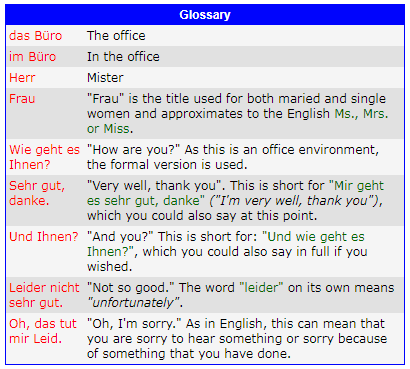Here are two conversations which practise the difference between formal and informal greetings. Pay particular attention to the different greetings which are used in the different contexts.
In our first conversation, Frau Müller meets her boss Doctor Schmidt as he comes in for work in the morning. Even though they have worked together for some time, they still use the formal "Sie" to address each other. Click here or on the sound icon below to listen to their conversation.
Conversation 1: Im Büro
Herr Dr. Schmidt Guten Morgen, Frau Müller.
Frau Müller Guten Morgen, Herr Doktor Schmidt. Wie geht es Ihnen?
Herr Dr. Schmidt Sehr gut, danke. Und Ihnen?
Frau Müller Leider nicht sehr gut.
Herr Dr. Schmidt Oh, das tut mir Leid.
Frau Müller Auf Wiedersehen, Herr Doktor Schmidt.
Herr Dr. Schmidt Auf Wiedersehen.

1. In German, people greet each other by name more often than we do in English-speaking countries. If someone is a doctor of any kind, this title immediately follows "Herr" or "Frau" - e.g. "Herr Doktor Schmidt", or "Frau Professor Meyer". As a general rule, you should avoid using first names in formal circumstances, unless you are speaking to a child.
2. The formal use of Fräulein to translate "Miss" is outdated and should be avoided, not least because the literal translation of Fräulein is "little woman"! You should instead use Frau.
3. Asking how someone is is normally a mere conversational formality, and the correct response is some form of "Fine thanks!" (see above). Compared to Anglo-Saxon countries however, asking about somebody's health is a comparatively private question in Germany, and on a bad day the person asked may give you a detailed run-down on his or her precise state of health!





